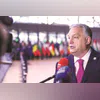Hungary blocks European Union aid for Ukraine after membership talks nod
EU leaders will reconvene for a second day of their summit meeting on Friday with several topics on the agenda, including the conflict between Israel and Hamas
)
Hungarian Prime Minister Viktor Orban
Listen to This Article
Hungarian Prime Minister Viktor Orban blocked the European Union’s planned financial aid package for Ukraine, sending the debate into early next year as the EU struggles to counter concerns that Western support is faltering.
Earlier Thursday, Kyiv notched a significant political victory when the EU unexpectedly agreed to open membership talks, but negotiations over a €50 billion ($54 billion) package remained stuck, even with 26 of the 27 members backing it.
The aid delay is likely to increase anxiety in Kyiv at a critical moment for the war-torn country. Ukraine’s counteroffensive, backed by billions in western weapons and training, has made limited progress. And in the US, the House of Representatives went into a holiday recess this week after failing to approve President Joe Biden’s request for $61 billion in assistance to Ukraine.
EU leaders will reconvene for a second day of their summit meeting on Friday with several topics on the agenda, including the conflict between Israel and Hamas.
European Council President Charles Michel said the Ukraine aid talks will extend into next year as members states continue to seek a way to bring Hungarian Prime Minister Viktor Orban on board. One option may be a back-up plan that would have member states funnel money to Ukraine outside of the EU budget process.
Also Read
Outgoing Dutch Prime Minister Mark Rutte said that 26 of the EU members agreed on the broad budget package, including Ukraine aid, and that EU leaders may hold an extra summit, perhaps in late January.
“I’m fairly confident we can get to a breakthrough early next year,” Rutte told reporters early Friday. “They still have time. Ukraine is not out of money in the next couple of weeks.”
Orban said in a post on X that he vetoed extra money for Ukraine, adding, “We will come back to the issue next year in the #EUCO after proper preparation.”
The amount of newly committed Western aid for Ukraine has dropped to its lowest level since the start of Russia’s invasion almost two years ago. Meanwhile, the Kremlin has ramped up military production at home and intensified its bombing campaign deep inside the country.
Kyiv can take some solace in the unexpected progress on membership talks. Prior to EU leaders meeting in Brussels, Orban had opposed opening the accession process, saying Ukraine wasn’t ready.
More From This Section
Topics : Hungary Russia Ukraine Conflict Ukraine Russia
Don't miss the most important news and views of the day. Get them on our Telegram channel
First Published: Dec 16 2023 | 12:16 AM IST
